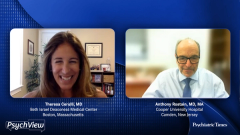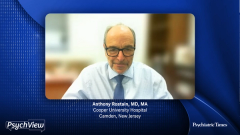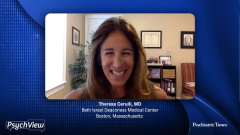
Future ADHD Treatment Options
Experts in attention-deficit/hyperactivity disorder discuss future nonmedication interventions, like trigeminal nerve stimulation and digital therapeutics.
Episodes in this series

Theresa Cerulli, MD: Tony, are there any other ADHD [attention-deficit/hyperactivity disorder] agents in the pipeline that you’re excited about?
Anthony Rostain, MD, MA: Nonmedication interventions are coming along. Trigeminal nerve stimulation, for example, has been approved. There are interesting data using certain video games that are helpful with improving working memory and reducing ADHD symptoms. We’re going to see a lot more attention paid to nonmedical interventions that have been studied, especially by companies developing technology-based approaches.
Theresa Cerulli, MD: I keep hearing the term digital therapeutics.
Anthony Rostain, MD, MA: It’s going to require a lot more study. But if you develop a platform that allows people to stay engaged and over time improves their ability to concentrate and to be less distracted, we’d all be excited about that. Many years ago we did a trial looking at transcranial direct cortical stimulation. That didn’t show much effect, but repeated transcranial magnetic stimulation is also being studied. We don’t know where that’s going. We’re waiting for further confirmation. Everybody is interested in using VR [virtual reality] and seeing how we can improve the ability of the brain to stay calm and focused and to enhance the attentional and executive circuits. Going back to what we think of the underlying pathophysiology of ADHD, 1 hypothesis that’s attractive is that the default mode network is overactive and not able to be suppressed sufficiently when the executive control systems are operating. In a way, you’re competing with 2 different circuits in the brain Perhaps using some of these other approaches will pay off. It will help individuals be able to switch between executive attentional control with less distraction from that default mode.
Theresa Cerulli, MD: Fascinating stuff.
Anthony Rostain, MD, MA: That’s speculative and not evidence based yet, but the models are suggesting that this is where we should go.
Theresa Cerulli, MD: The nomenclature and the mechanism of action are confusing. TMS [transcranial magnetic stimulation] is direct cortical stimulation. You mentioned briefly TNS, which is trigeminal nerve stimulation. That device, which is about the size of a cell phone, was FDA approved. It’s the first digital therapeutic approved for treating ADHD. It already exists. None of us has had much experience with it. It’s been tested in a only few sites—more on the west coast, but it’s been approved. What’s different about TNS is that it isn’t direct cortical stimulation. It’s indirect. It’s a bottom-up model. I won’t go into the details. We’re running out of time, but it’s fascinating. There’s so much to be done with this.
Anthony Rostain, MD, MA: I should have made that distinction. I’m sorry I didn’t. The trigeminal nerve is not top down. It’s the other way around. It works from below to above.
Theresa Cerulli, MD: Below to above with very low hertz.
Anthony Rostain, MD, MA: Overnight.
Theresa Cerulli, MD: Excellent. The only other 1 I want to add from the pipeline—it popped into mind as an interesting product—is centanafadine. It’s a triple reuptake inhibitor. It elevates levels with dopamine, norepinephrine, and serotonin. If we had more time, I’d love to dig more deeply into other pipeline products. Tony, is there anything you want to add before we wrap up?
Anthony Rostain, MD, MA: From the standpoint of treating adults with ADHD, there’s a lot of hope. There are a lot of new approaches. But most of all, we’re integrating medical and other intervention approaches, helping people cope better, helping them manage time better, and learning how to develop skills that may be underdeveloped while reducing the negative coping mechanisms that people often rely on because they’ve overlearned how to avoid and underlearned how to engage when things are difficult.
Theresa Cerulli, MD: Thank you so much. That’s a wealth of information. I’m glad we had a chance to talk about this interesting topic. As I said, it’s near and dear to my heart, so my favorite word that you just used was hope. There have been so many advancements since I started in the field 20 years ago. There’s much to be hopeful about. It’s so rewarding. We can make a difference. We’re making a difference. It’s 1 of the most treatable conditions, so thank you.
Anthony Rostain, MD, MA: All of you listening will see tremendous gratitude from patients for being able to provide the tools they need to live better lives.
Theresa Cerulli, MD: Absolutely. It’s great to see you, Anthony.
Anthony Rostain, MD, MA: Thank you. Thanks for hosting. This has been great.
Theresa Cerulli, MD: Wonderful. Take care.
Transcript edited for clarity
Newsletter
Receive trusted psychiatric news, expert analysis, and clinical insights — subscribe today to support your practice and your patients.










